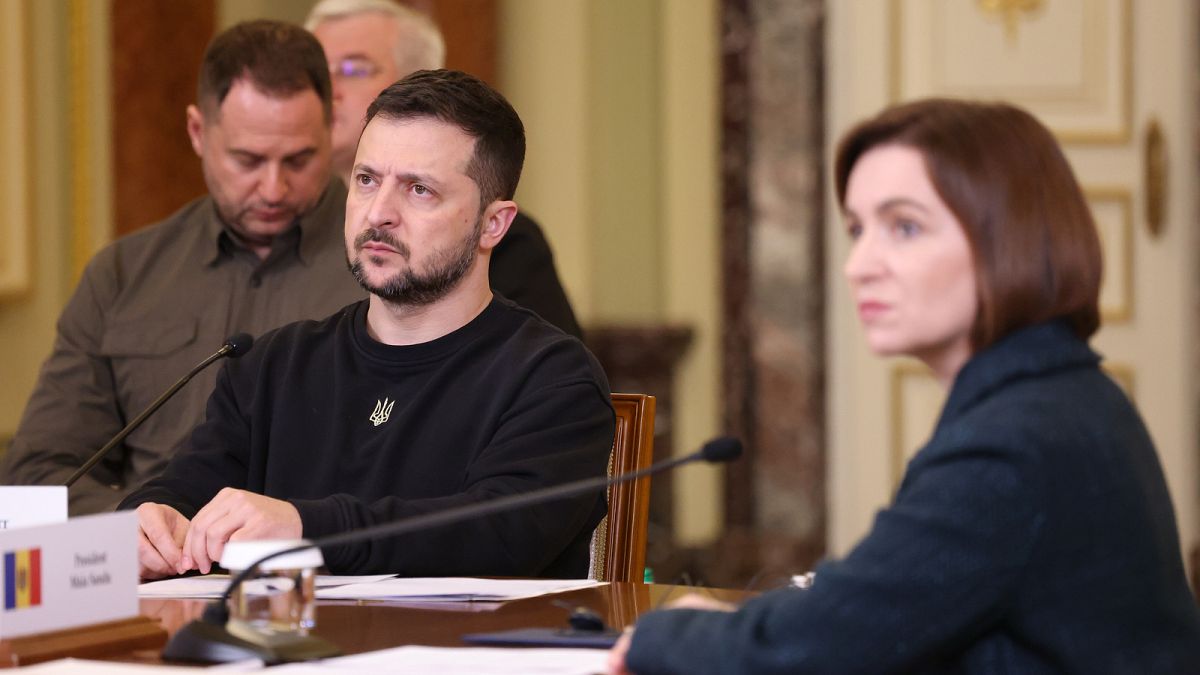The twelve capitals say formal talks on both countries’ EU membership bids should be convened ‘by the end of June’.
Ministers from twelve EU countries have called for the next steps in Ukraine and Moldova’s EU membership bids to be opened before the end of June, when the Hungarian government of Viktor Orbán is due to take on the six-month rotating presidency of the Council of the EU.
In a letter addressed to Belgian foreign minister Hadja Lahbib, whose government currently presides over the Council, the ministers say that swift progress on both Kyiv and Chișinău’s accession process would “boost morale and further the work on reforms in these countries.”
The letter, first reported on by Euractiv, was spearheaded by Czechia, according to diplomatic sources. It was also signed by foreign or European affairs ministers from Sweden, Estonia, Finland, Portugal, Latvia, Poland, Lithuania, Germany, Slovenia, Romania and Slovakia.
Whilst it has not officially signed the letter, France is also committed to “do everything” it can to “hold the first intergovernmental conference before the end of the month,” according to a source from the Élysée.
The twelve capitals want member states to adopt the negotiating frameworks – the roadmap for accession talks – and to kick off negotiations by convening the first intergovernmental conferences with both countries by the end of this month.
Both steps require the unanimous blessing of all 27 EU member states, but according to diplomats, Hungary is currently blocking both decisions.
The opening of accession talks with Ukraine and Moldova was approved in principle by the EU’s 27 countries back in December, with Hungary abstaining.
But Hungarian Prime Minister Viktor Orbán has consistently voiced opposition to swiftly progressing on Ukraine’s accession, citing concerns over the levels of corruption in the country and the lack of measures to protect the rights of the Hungarian minority in the border region of Transcarpathia.
Countries waiting in line to join the bloc must implement a range of reforms, including judicial, constitutional and economic overhauls, before they can be considered ready for membership. The process is notoriously long, and has on average taken around a decade for hopeful countries.
The opening of negotiations is just one in a long series of steps, all of which require the unanimous backing of current EU members.
With Orbán’s government due to take on the presidency of the Council of the EU from July – giving it the power to set the agenda and chair ministerial meetings – ministers are fearful that the talks could be further derailed unless Hungary concedes by the end of June.
It comes as exasperation with Orbán’s government grows as it continues to veto key decisions on military aid to Kyiv.
‘Time to move forward’
The twelve ministers insist that given the “results achieved and the ongoing reform efforts in both Ukraine and Moldova,” it is now “time to move forward.”
“To continue the credible enlargement process, the EU should provide tangible benefits for the populations of the respective countries,” the letter reads, floating the much-touted concept of phased integration to EU policies and programmes before giving candidate countries full-fledged membership.
The concept is championed in a joint Franco-German proposal unveiled last September, with energy, single market and security floated as potential policy areas where candidate countries could be integrated before becoming EU members.
EU leaders such as European Council President Charles Michel have pushed for an acceleration in the accession progress, calling on the EU itself to do its homework and be prepared to enlarge by the end of this decade.
Michel has previously described enlargement as a geopolitical imperative, saying the bloc must get bigger or risk facing a “new Iron Curtain” along its eastern flank.
But critics such as Orbán have warned that the possible integration of Ukraine – the war-stricken country whose GDP per capita is three times smaller than that of Bulgaria, the EU’s smallest economy – would destabilise the bloc’s budgetary structure and mean many EU countries would switch from net beneficiaries to net contributors.
Experts estimate that Ukraine’s potential EU accession could have an impact of between €110 billion and €136 billion on the bloc’s seven-year budget, a cost of between 0.1% and 0.13% of the EU’s gross domestic product (GDP).

